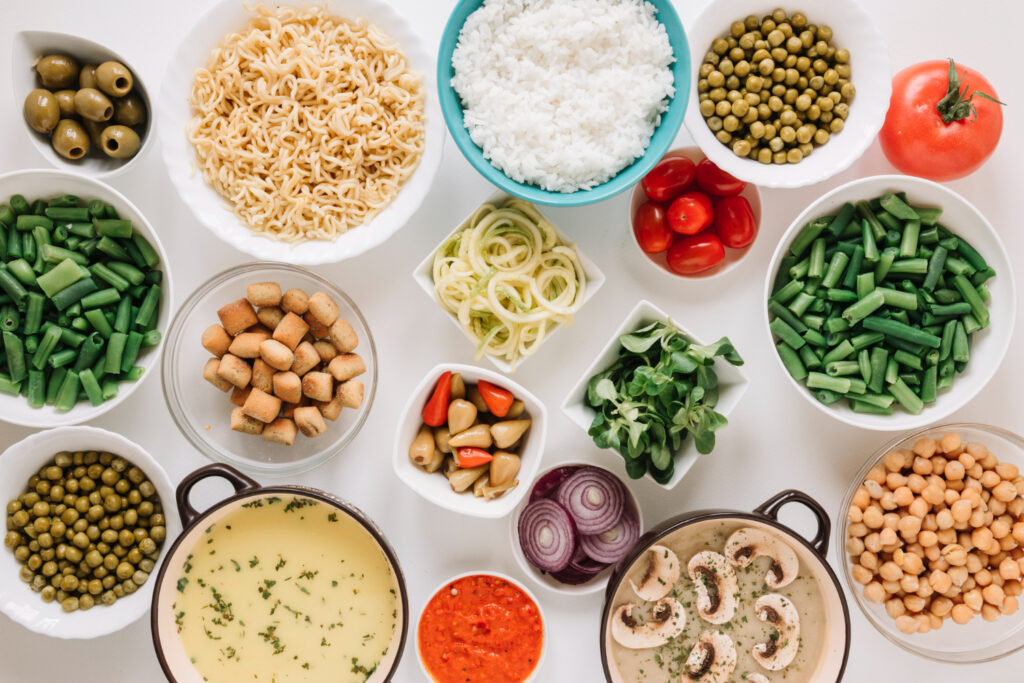
In this article
Overview
Ever had that heavy, sluggish feeling? Constipation might be the culprit. While occasional constipation affects many, for some, it becomes a chronic issue, especially as they age. Identifying constipation is straightforward: fewer than three bowel movements a week, coupled with hard, dry stools that are tough to pass.
Why Diet Matters
Your diet plays a crucial role in managing constipation. Fiber, a type of carbohydrate, is key. Unfortunately, most adults consume only half of the recommended daily fiber intake. According to the Dietary Guidelines for Americans, women should aim for 22-25 grams of fiber daily, while men should target 28-31 grams. Instead of counting every gram, focus on integrating high-fiber foods into your diet.
Top 10 Fiber-Rich Foods
- Pears: One medium pear contains 6 grams of fiber. For maximum benefit, keep the peel on.
- Oats: A cup of cooked oatmeal offers 4 grams of fiber. Enhance your bowl with fresh or frozen fruit for added fiber.
- Potatoes: With the skin on, a medium potato provides 3 grams of fiber and a healthy dose of vitamin C.
- Flaxseed and Chia Seeds: Sprinkle these seeds on oatmeal, smoothies, or baked goods to easily boost your fiber intake.
- Beans: Rich in protein, iron, and fiber, a half-cup of cooked kidney beans offers about 6 grams of fiber. Consider a bean-based meal at least once a week.
- Popcorn: A great whole grain snack, providing 1 gram of fiber per cup.
- Lentils: A half-cup of cooked green lentils boasts 9 grams of fiber, comparable to the protein found in 2 ounces of beef.
- High-Fiber Cereal: Choose brands with at least 5 grams of fiber per serving. Adding fruits like blueberries or bananas can further increase fiber content.
- Apples: A medium apple, with skin, provides 4 grams of fiber and plenty of water to help with hydration.
- Edamame: These nutty soybeans offer 4 grams of fiber per half-cup.
Boosting Your Fiber Intake
As you start incorporating more fiber into your diet, remember to:
- Hydrate: Drinking plenty of water is essential to help fiber do its job effectively.
- Take It Slow: Gradually increase your fiber intake to avoid gas and bloating.
- Stay Active: Regular physical activity, even a daily walk, can improve your digestive system’s efficiency.
When Diet Isn’t Enough
Sometimes, dietary changes alone may not alleviate constipation. If you continue to struggle, consult your doctor. They might recommend treatments like medication. Always seek medical advice if you notice blood in your stool or experience abdominal pain.
Remedies
- Olive and Flaxseed Oils: These oils may serve as gentle laxatives, aiding digestion through their antioxidant, antibacterial, and anti-inflammatory qualities
- Probiotics: Beneficial bacteria that enhance gut health and soften stools. Notable sources include yogurt, kefir, and sauerkraut. Studies show that probiotics can improve constipation significantly.
- Fibrous Vegetables: Vegetables like broccoli, rich in sulforaphane, can prevent harmful intestinal microorganisms from thriving.
- Pulses: Beans, lentils, and peas are fiber powerhouses, with a half-cup serving providing a significant portion of your daily fiber needs.
High-Fiber Fruits
- Kiwifruit: Contains the enzyme actinidin, which aids in digestion and alleviates gastrointestinal symptoms.
- Apples and Pears: High in water and fiber, aiding digestion and preventing constipation.
- Grapes, Blackberries, and Raspberries: High in fiber and water content, these fruits can help ease constipation.
- Prunes: Packed with fiber and sorbitol, which have beneficial gastrointestinal effects.
Whole Grains and Fermented Dairy
- Whole Wheat Bread, Cereals, and Pasta: Excellent sources of insoluble fiber. Wheat bran, in particular, has been shown to improve bowel habits.
- Kefir: A probiotic-rich dairy product that improves gut microbiome and reduces abdominal pain.
Alternative Treatments and Causes
If lifestyle and dietary changes don’t suffice, a variety of laxatives might be recommended. Chronic constipation could indicate underlying medical conditions like IBS, celiac disease, or hypothyroidism. Certain medications can also contribute to constipation, such as opioids, antidepressants, and antihistamines.
The Takeaway
Managing constipation effectively involves a holistic approach: a fiber-rich diet, adequate hydration, regular physical activity, and, if necessary, medical intervention. By incorporating these high-fiber foods and making lifestyle adjustments, you can significantly improve your digestive health.
Reflect on your dietary habits, make necessary changes, and don’t hesitate to seek professional advice if needed. Your gut health is crucial for your overall well-being
A Quick Review
Constipation is a common issue that can significantly impact your daily life. Adjusting your diet to include high-fiber foods is a key step in preventing and alleviating constipation. This article explores the best foods, such as pears, oats, and beans, to promote digestive health, along with tips on incorporating them into your diet and lifestyle changes to support regular bowel movements
Frequently asked questionsay
What is constipation?
Constipation refers to having fewer than three bowel movements a week, with hard, dry stools that are difficult to pass.
How can diet help prevent constipation?
Eating high-fiber foods can help keep your digestive system running smoothly, as fiber adds bulk to stools and promotes regular bowel movements.
What are some high-fiber foods that can prevent constipation?
Some high-fiber foods include pears, oats, beans, lentils, apples, and whole grain cereals.
Why is water important when increasing fiber intake?
Drinking plenty of water helps fiber work more effectively by softening stools and making them easier to pass.
Can physical activity help with constipation?
Yes, regular physical activity, such as walking, can stimulate your digestive system and promote regular bowel movements.
What should I do if dietary changes don’t relieve my constipation?
If dietary changes don’t help, consult a doctor. You may need other treatments, such as medication, to address chronic constipation.












I think this is among the most significant information for me. And i am glad reading your article. But wanna remark on some general things, The web site style is great, the articles is really great : D. Good job, cheers
We still cannot quite assume that I made it worse often be kind of staring at the important points seen on your blog post. Our grandkids and i also are sincerely thankful with regards to your generosity plus giving me possibility pursue our chosen profession path. Document information and facts I became of the web-site.
I very lucky to find this website on bing, just what I was searching for too saved to bookmarks.
I’m really impressed with your writing skills and also with the layout on your blog. Is this a paid theme or did you customize it yourself? Anyway keep up the excellent quality writing, it is rare to see a great blog like this one these days..
whoah this blog is magnificent i love reading your articles. Keep up the great work! You know, a lot of people are hunting around for this info, you could help them greatly.
howdy, I’ve been ranking the crap out of “pre spun articles”.
Spot up for this write-up, I actually believe this excellent website needs a lot more consideration. I’ll oftimes be once again to learn to read far more, thanks for that info.
You could definitely see your expertise within the paintings you write. The arena hopes for even more passionate writers like you who aren’t afraid to mention how they believe. All the time go after your heart.
What your stating is absolutely accurate. I know that everyone have to say the identical factor, but I just feel that you put it in a way that absolutely everyone can realize. I also really like the photographs you set in right here. They fit so effectively with what youre hoping to say. Im sure youll achieve so numerous men and women with what youve acquired to say.
Spot i’ll carry on with this write-up, I must say i think this site requirements far more consideration. I’ll oftimes be once more to study additional, appreciate your that information.
F*ckin’ tremendous issues here. I am very satisfied to see your post. Thank you a lot and i’m looking ahead to contact you. Will you please drop me a e-mail?
Hiya, I am really glad I’ve found this information. Nowadays bloggers publish only about gossips and net and this is actually irritating. A good blog with interesting content, this is what I need. Thanks for keeping this website, I’ll be visiting it. Do you do newsletters? Cant find it.
there are many different operating systems but of course i would still prefer to use linux for stability~
I liked as much as you’ll obtain carried out proper here. The sketch is attractive, your authored material stylish. nonetheless, you command get got an shakiness over that you wish be handing over the following. in poor health indisputably come more until now again since exactly the similar just about very ceaselessly inside of case you shield this hike.
Hey very cool web site!! Man .. Beautiful .. Amazing .. I will bookmark your I’m happy to find a lot of useful info here in the post, we need work out more strategies in this regard, thanks for sharing. . . . . .
Heya i am for the first time here. I found this board and I to find It really useful & it helped me out a lot. I’m hoping to provide one thing again and aid others like you aided me.
Outstanding post however I was wondering if you could write a litte more on this subject? I’d be very grateful if you could elaborate a little bit further. Thanks!